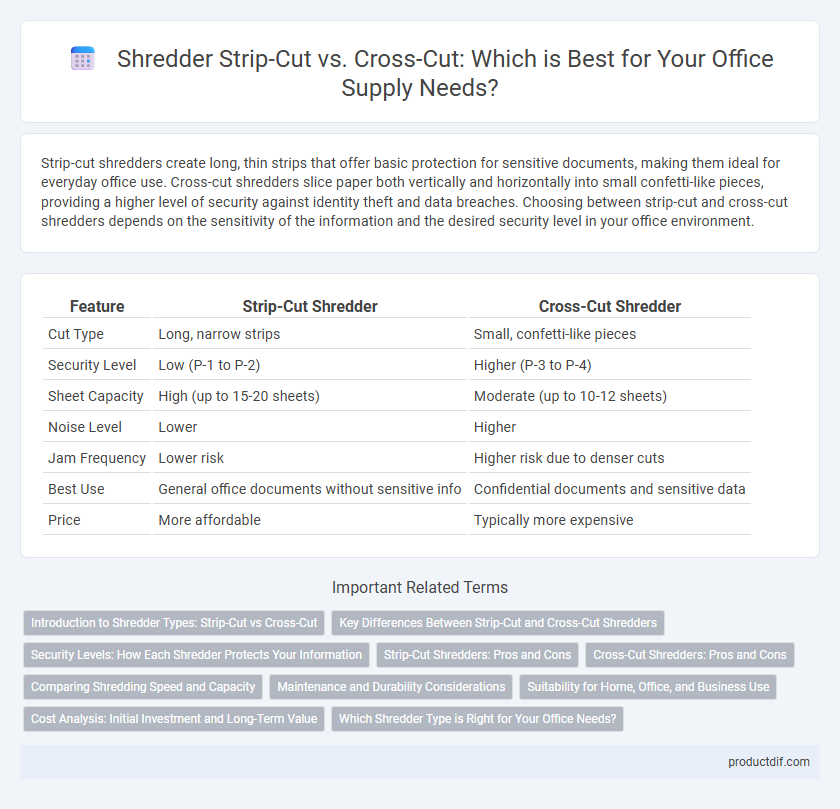Strip-cut shredders create long, thin strips that offer basic protection for sensitive documents, making them ideal for everyday office use. Cross-cut shredders slice paper both vertically and horizontally into small confetti-like pieces, providing a higher level of security against identity theft and data breaches. Choosing between strip-cut and cross-cut shredders depends on the sensitivity of the information and the desired security level in your office environment.
Table of Comparison
| Feature | Strip-Cut Shredder | Cross-Cut Shredder |
|---|---|---|
| Cut Type | Long, narrow strips | Small, confetti-like pieces |
| Security Level | Low (P-1 to P-2) | Higher (P-3 to P-4) |
| Sheet Capacity | High (up to 15-20 sheets) | Moderate (up to 10-12 sheets) |
| Noise Level | Lower | Higher |
| Jam Frequency | Lower risk | Higher risk due to denser cuts |
| Best Use | General office documents without sensitive info | Confidential documents and sensitive data |
| Price | More affordable | Typically more expensive |
Introduction to Shredder Types: Strip-Cut vs Cross-Cut
Strip-cut shredders slice paper into long, narrow strips, offering basic security suitable for routine document disposal. Cross-cut shredders cut paper both vertically and horizontally, producing small confetti-like pieces that enhance confidentiality by preventing easy reconstruction. Choosing between strip-cut and cross-cut shredders depends on the required security level and volume of shredding tasks.
Key Differences Between Strip-Cut and Cross-Cut Shredders
Strip-cut shredders slice paper into long, narrow strips typically 12 to 15 millimeters wide, offering basic security suitable for everyday office documents. Cross-cut shredders chop paper both vertically and horizontally into confetti-like particles, generally 4 to 8 millimeters in size, providing enhanced protection against identity theft and confidential data breaches. The choice between strip-cut and cross-cut shredders depends on required security levels, with cross-cut models rated higher by the NSA for sensitive document disposal.
Security Levels: How Each Shredder Protects Your Information
Strip-cut shredders produce long, thin strips that offer basic security by making documents unreadable to casual observers, ideal for everyday office use. Cross-cut shredders slice paper into small, confetti-like pieces, providing higher security by significantly reducing the risk of reconstruction, essential for sensitive or confidential information. Understanding the security levels defined by standards such as DIN 66399 helps businesses choose the appropriate shredder to protect customer data and comply with privacy regulations.
Strip-Cut Shredders: Pros and Cons
Strip-cut shredders create long, narrow strips by slicing paper into uniform pieces, offering faster shredding speeds and typically lower prices compared to cross-cut models. Their simple cutting mechanism results in less maintenance and quieter operation but produces less secure shredding, as the longer strips are easier to reconstruct. Ideal for basic document disposal with low-security requirements, strip-cut shredders are less suitable for sensitive information due to their limited data protection.
Cross-Cut Shredders: Pros and Cons
Cross-cut shredders provide enhanced security by cutting paper into small, confetti-like pieces, making it difficult to reconstruct sensitive documents. They operate more quietly than strip-cut shredders and effectively reduce paper volume for easier disposal. However, cross-cut shredders tend to be more expensive and slower, with a higher risk of paper jams compared to strip-cut models.
Comparing Shredding Speed and Capacity
Strip-cut shredders typically offer faster shredding speeds and higher sheet capacities per pass, making them suitable for handling large volumes of office documents quickly. Cross-cut shredders, while providing enhanced security by cutting paper into smaller particles, generally operate at slower speeds and process fewer sheets simultaneously. Choosing between the two depends on balancing the need for shredding efficiency against security requirements.
Maintenance and Durability Considerations
Shredder strip-cut models require less frequent blade maintenance due to their simpler cutting mechanism but produce longer strips that are less secure. Cross-cut shredders, while demanding more regular cleaning and occasional blade replacement to prevent jams, offer enhanced durability through thicker blades designed to handle paper fibers more efficiently. Ensuring proper lubrication and avoiding overload in both types extends the shredder's lifespan and maintains optimal performance.
Suitability for Home, Office, and Business Use
Strip-cut shredders provide basic security by cutting documents into long, thin strips, making them suitable for home use where minimal sensitive information is handled. Cross-cut shredders offer enhanced security by slicing paper into small confetti-like pieces, ideal for office and business environments requiring protection of confidential data and compliance with privacy regulations. Selecting the appropriate shredder depends on the volume of shredding and the level of document security needed for each setting.
Cost Analysis: Initial Investment and Long-Term Value
Strip-cut shredders generally offer a lower initial investment with simpler mechanics that reduce upfront costs. Cross-cut shredders, while more expensive initially, provide enhanced security and durability, yielding greater long-term value by protecting sensitive information and reducing maintenance frequency. Evaluating total cost of ownership between strip-cut and cross-cut shredders reveals that cross-cut models often justify their higher price through extended lifespan and compliance benefits.
Which Shredder Type is Right for Your Office Needs?
Strip-cut shredders create long, narrow strips, offering a faster shredding speed and larger bin capacity, ideal for low-security office documents such as memos and general correspondence. Cross-cut shredders slice paper into small confetti-like pieces, providing higher security by making document reconstruction almost impossible, making them suitable for sensitive information like financial records and confidential reports. Choosing the right shredder depends on balancing security requirements with shredding volume and speed to protect your office data effectively.
Shredder Strip-cut vs Cross-cut Infographic

 productdif.com
productdif.com